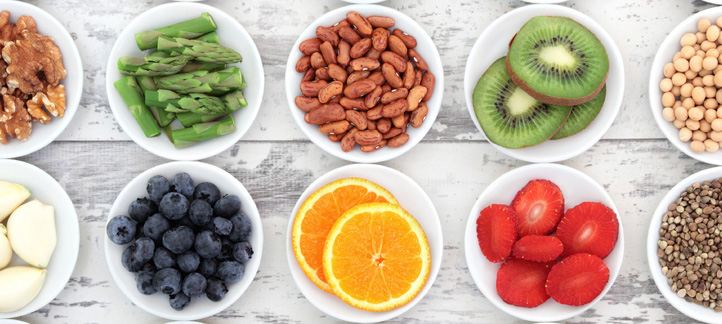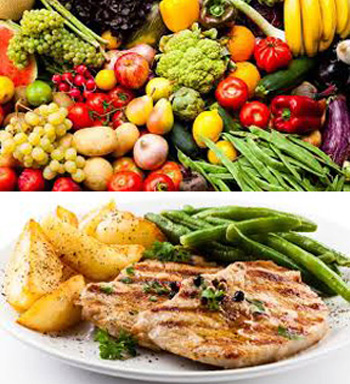Nutrition
 You don’t have to change your diet for life overnight – list down what you eat – in yourNutrition training log – to see if you are having too much or too little of sugar, fats, carbohydrates etc – do you need to reduce a little bit of something? Try reducing that one coke, or a little bit of butter or oil, along with your exercising, as that will help you swiften your progress towards your goal of weight reduction, trimming inches off the waist, cholestrol reduction…. The important thing is to take a holistic view of your diet and not cut out things totally and not too quickly either. A nutrition plan for runners actually is not rocket science for the most part. It requires eating and drinking most things in moderation. Nutrition for runners as you will read in any literature – is about hydration, carbs pre long runs and a good dose of fibre.
You don’t have to change your diet for life overnight – list down what you eat – in yourNutrition training log – to see if you are having too much or too little of sugar, fats, carbohydrates etc – do you need to reduce a little bit of something? Try reducing that one coke, or a little bit of butter or oil, along with your exercising, as that will help you swiften your progress towards your goal of weight reduction, trimming inches off the waist, cholestrol reduction…. The important thing is to take a holistic view of your diet and not cut out things totally and not too quickly either. A nutrition plan for runners actually is not rocket science for the most part. It requires eating and drinking most things in moderation. Nutrition for runners as you will read in any literature – is about hydration, carbs pre long runs and a good dose of fibre.
Before a slightly more strenuous weekend running schedule, your nutrition plan will be more carbohydrate heavy, as you take in an extra helping of (brown) rice or pasta. But drop the hollow carbs of carbonated drinks/ alcohol as they dont count. Alcohol, additionally, tends to dehydrate rather than hydrate.
Nutrition and hydration: Drink a lot of water and keep yourself hydrated. Drink a cup or two of water before you get out for a run. Orange juice is also great.. Keep a bottle of water with you on your walks/runs and sip as and when – this is key
You will lose a lot of salt along with water, while you exercise, so don’t cut down on your salt intake, in fact, you could even consider increasing it judiciously.. For a long run, it may be worthwhile to carry a small sachet of salt with you, to take a lick of, should you feel the need to.
Eat as much of raw foods as possible – salads (reduce or cut the salad dressing and use vinegar or lemon), raw vegetables, fruit.. and add some roughage and bran to your diet. Whole wheat bread. Soya is great. Soya is probably one of the richest sources of protein for vegetarians and non vegetarians alike.
A banana a day keeps the doctor away – for a runner – great on energy, easy and quick to digest, and rich in Potassium. Now that’s a pack of nutrition which is a ‘peeling’!
 Running a marathon is not merely running a race but is a science which requires impeccable planning, strong will, focus, and months of training before we participate.
Running a marathon is not merely running a race but is a science which requires impeccable planning, strong will, focus, and months of training before we participate.
Nutrition is one of the most areas to give your full attention during marathon training and preparation.
Selecting the “right” foods is the most important area of nutritive diet. Thus marathon runners’ food should focus on the following nutrients at the time of training
Carbohydrate,
Protein,
Fat,
And most forgotten nutrient ‘Water’
But the question still remains – How much and what?
The meal before the marathon day, or even a long run of more than 15 miles (24km) becomes very important so as to avoid sleeping problems, stomach upsets, lethargy, flatulence, acidity, etc.Ideal meal the day before the marathon run:
Breakfast
2 slices whole wheat bread + 1 tsp Jam + Milk 1 glass + 1 Banana OR
1 bowl Breakfast cereal (wheat flakes / oats) + 1 glass Skim milk + 1 Fruit (mango / banana / guava )
Mid afternoon
1 big bowl Sago khitchadi OR 2 bananas / Guava / Sapota (Chickoo) / Mango / Custardapple (Sitaphal)
Dinner
2 roti + 1 small bowl root vegetable ( potato, colocasia (arbi), sweet potato) + 1 glass buttermilk OR 1 big bowl Whole wheat pasta in tomato sauce and veggies + 1 glass orange juice OR I big plate of biryani
Ideal Pre – Race Meal Breakfast
2 slice whole wheat bread + 1 tsp Jam + 1 Banana + 1 orange juice OR 1 bowl Breakfast cereal (whole wheat flakes / oats) + 1 orange juice + 1 Fruit OR 1 bowl Whole wheat pasta with tomato pasta sauce + 1 glass guava nectar OR Energy bar (150 – 200 kcal) + Juice / Water + Fruit (Watermelon) Milk can act as a laxative if had before a run
Tips to remember:
Load your self with carbohydrate.
Care should be taken of not over loading yourself with fiber as it could lead to stomach upsets like flatulence, constipation, or diarrhea.
Consume proteins in moderation. Do not over eat proteins especially non vegetarian foods a day before the run as they take longer time to digest. Also, it will increase body’s requirement for water.
Monitor your fat intake as overeating will make you feel sluggish and it also takes longer time to digest.
Double your water intake; Drink before you feel thirsty – because – Thirst is already a symptom of dehydration.
But, avoid tea, coffee, alcohol, and colas as they act as diuretics, which will further lead to loss of fluid from the body.
Avoid trying anything new food stuff or a drink on the pre race day or on the race day, to which the body is not accustomed.
Also, do not exercise or run till two hours after eating your meal as the food takes two hours to pass through stomach and protein and fat takes still longer i.e. 3 – 5 hours to pass through.
Post Marathon – After the race:
After the race is over, continue to drink fluids (water, sports drinks, and/or juice products are all great choices). As soon as possible (ideally within 15 minutes), grab something nutritious to eat to replace your depleted glycogen stores. Research indicates that to avoid muscle fatigue the next day, protein and carbohydrates should be eaten as soon as possible following long duration exercise. In gist,
So, On your marks, Get set, EAT Right…
Running requires a combination of right training and a healthy diet.
Remember, no matter how vigorous is your running schedule is, it is important to increase your FoodCarbohydrate (CHO) intake, which is main fuel for running. Good food choices with proper combination of nutrients and the correct timing of meals may enhance performance. Also eat more frequently but smaller quantities.. Golden Rule to remember – Eat only familiar foods before a run. What needs to be included and excluded for staying fit while training for a 5 km run, or just running to stay trim and fit.
ALWAYS REMEMBER – Eat breakfast like a king, lunch like a prince and dine like a pauper.
Breakfast Choice –
Generally include a combination of all three macro nutrients i.e. Carbohydrate, Idliprotein and fat.
Snacks Choice – Include Foods which are Carbohydrate rich and energy dense.

Snacks Choice – Have a hearty meal which is rich in Carbohydrate. Do not over load yourself or else fatigue and lethargy will set in.
Drink Choice – Being well hydrated is critical to good blood volume, cardiac output and delivery of oxygen to the working muscles. Staying well hydrated also decreases the risk of muscle cramping, regulates core body temperature and gets rid of unwanted waste. Water intake should be at least
FOODS TO BE AVOIDED – Include Foods which are Carbohydrate rich and energy dense.
So, eat the right foods in the right quantities which will help you build up your energy stores and fight fatigue. However, it is also important to eat at the right time. And yes, don’t forget to keep yourself hydrated.
Start running, eat well, and stay fit!

Kirti Tatiwala
Registered Dietitian
Practicing nutritionist
Nature’s Basket
Godrej Agrovet Limited
Write in to us for more specific queries at contactus@runningandliving.com
If you would like to receive a free brief monthly mailer on news, stories, information and fun stuff on running – drop us a mail atcontactus@runningandliving.com and send us your name and city of residence”

 contactus@runningandliving.com
contactus@runningandliving.com click here
click here click here
click here